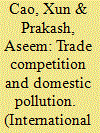| Srl | Item |
| 1 |
ID:
139918


|
|
|
|
|
| Summary/Abstract |
This article proposes a political economy approach to decolonization. Focusing on the industrial organization of agriculture, it argues that competition between colonial and metropolitan producers creates demands for decolonization from within the metropole when colonies have broad export profiles and when export industries are controlled by colonial, as opposed to metropolitan, interests. The author applies this framework to the United States in the early 1900s, showing that different structures of the colonial sugar industries in the Philippines, Hawaii, and Puerto Rico–diverse exports with dispersed local ownership versus monocrop economies dominated by large US firms–explain why protectionist continental-agriculture interests agitated so effectively for independence for the Philippines, but not for Hawaii or Puerto Rico. A comparative historical analysis of the three colonial economies and the Philippine independence debates complemented by a statistical analysis of roll call votes in the Hare-Hawes-Cutting Act supports the argument. In providing a new perspective on economic relations in the late-colonial era, the argument highlights issues of trade and empire in US history that span the subfields of American political development, comparative politics, and international political economy.
|
|
|
|
|
|
|
|
|
|
|
|
|
|
|
|
| 2 |
ID:
097722


|
|
|
|
|
| Publication |
2010.
|
| Summary/Abstract |
This research note examines whether trade competition abets regulatory races in the environmental area. To analyze trade competition, we develop a new measure, structural equivalence, which assesses competitive threats that a country faces from other countries whose firms export the same products to the same destination countries. Employing this new measure, we analyze air pollution intensity (sulfur dioxide or SO2) and water pollution intensity (biochemical oxygen demand or BOD) for a panel of 140 countries for the time period 1980-2003. We find that trade competition is a significant predictor of water pollution intensity among structurally equivalent countries. We then test separately whether trade competition abets upward and downward regulatory races. We find that in the case of water pollution, countries respond symmetrically to downward and upward races, that is, they follow their structurally equivalent competitor countries both when they ratchet down their regulations and when they ratchet up regulations. In the case of air pollution, however, countries are responsive to downward policy changes only in competitor countries.
|
|
|
|
|
|
|
|
|
|
|
|
|
|
|
|